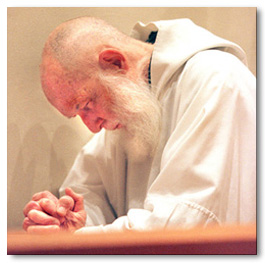Does Prayer Work?
- MARK EARLEY
The headlines seemed almost triumphal in tone. Prayer Doesnt Aid Recovery, Study Finds. That was the Washington Post. Long-Awaited Medical Study Questions the Power of Prayer. That was the New York Times.
 |
The research, led by Jeffery Dusek of the Harvard Medical School, involved 1,802 heart-bypass patients. One-third were told they would be prayed for (but they weren’t), one-third were told they might receive prayer, and one-third were told they would definitely be prayed for. Catholics and Protestants who agreed to pray for certain patients were told to ask for “a successful surgery with a quick, healthy recovery and no complications.”
Patients in the two groups that did not know if anyone was praying for them had about the same rate of complications — 52 percent — regardless of whether they were being prayed for. But 59 percent of the patients who knew they were being prayed for suffered complications.
The researchers were quick to downplay the unexpected results. Knowing they were being prayed for may have led to stress among patients, they noted. And as one doctor put it, “Did the patients think, ‘I am so sick they had to call in the prayer team?’”
Naturally, some observers were delighted at the results. They think the study proves conclusively that prayer doesn’t work, and it’s time for men of science to “stop dabbling in the supernatural,” as one academic put it.
But wait a minute. The researchers acknowledged that they could not control for the fact that many “unauthorized” people may have interceded for loved ones in the so-called “unprayed-for” group. And plenty of other studies indicate that intercessory prayer does have an impact.
But perhaps the study’s biggest flaw involves how the results were interpreted. Christians know that there are three possible answers to prayer: “Yes,” “no,” and “wait.” The Harvard study measured only the “yes” answers. |
But perhaps the study’s biggest flaw involves how the results were interpreted. Christians know that there are three possible answers to prayer: “Yes,” “no,” and “wait.” The Harvard study measured only the “yes” answers. But just because we don’t get the answer we’re looking for does not mean God is not listening or answering.
We are given a glorious example of this truth by Jesus Himself. On the night before His arrest, praying in the Garden of Gethsemane, an agonized Jesus asked God to remove the cup that was before Him. He prayed that He would not have to go to the Cross. And yet, not long afterward, Jesus did die on the Cross.
To a modern researcher, this is the perfect example of a prayer that went unanswered. But we know that God did answer this prayer. He answered it in a way that led, over the next twenty centuries, to salvation for millions. And on Easter Sunday, millions of Christians around the world will thank God for answering it the way He did.
Yes, Jesus died on the Cross. But He rose again on the third day. And thanks to that so-called “unanswered prayer,” you and I can say this Easter, “Hallelujah! Christ is risen!”
And no matter what the researchers tell us, we know we can trust God to hear, and answer, every prayer.
![]()
For further reading and information:
Today’s BreakPoint offer: Being the Body: A New Call for the Church to Be Light in the Darkness by Charles Colson and Ellen Vaughn.
Rob Stein, “Prayer Doesn’t Aid Recovery, Study Finds,” Washington Post, 31 March 2006, A06.
Malcolm Ritter, “Study: Praying Won’t Affect Heart Patients,” Washington Post, 30 March 2006.
Benedict Carey, “Long-Awaited Medical Study Questions the Power of Prayer,” New York Times, 31 March 2006.
“Amen Corner,” Wall Street Journal, 6 April 2006.
“Prayer Study Q & A,” USA Today, 30 March 2006.
Valerie Reiss, “Why I Believe in the Power of Prayer,” Beliefnet, 31 March 2006.
Mary Sanchez, “Foolish Efforts to Validate the Power of Prayer,” Kansas City Star, 11 April 2006.
Ted Olsen, “Weblog: Jesus Didn’t Walk on Water, Judas Was a Hero, Evolution ‘Proved,’ Prayer Doesn’t Work . . . ,” Christianity Today, 7 April 2006.
“On Pain and Hidden Gethsemanes,” Zenit, 17 March 2006.
“Love and Sacrifice,” Philippine Daily Inquirer, 12 April 2006.
Charles Colson and Nancy Pearcey, How Now Shall We Live? (Tyndale, 1999).
BreakPoint Commentary No. 011012, “Can Prayer Heal?: Science Looks at Prayer.” (Free registration required.)
BreakPoint Commentary No. 60607, “Calling on the Great Physician: Researchers Discover the Power of Prayer.” (Free registration required.)
“The Great Reversal,” Christianity Today, April 17, 2000: A four-part series including “Maundy Thursday” by Walter Wangerin, Jr., “Good Friday” by Virginia Stem Owens, “Holy Saturday” by Eugene H. Peterson, and “Easter Sunday” by Philip Yancey.
 This is Fraser Field, Founder of CERC. I hope you appreciated this piece. We curate these articles especially for believers like you.
This is Fraser Field, Founder of CERC. I hope you appreciated this piece. We curate these articles especially for believers like you.
Please show your appreciation by making a $3 donation. CERC is entirely reader supported.

Acknowledgement
Mark Earley. "Does Prayer Work?" BreakPoint Commentary April 13, 2006.
The Author
Paul Johnson, celebrated journalist and historian, is the author most recently of George Washington: The Founding Father. Among his other widely acclaimed books are A History of the American People, Modern Times, A History of the Jews, Intellectuals, Art: A New History, and The Quest for God: Personal Pilgrimage. He also produces brief surveys that slip into the pocket, such as his popular The Renaissance and Napoleon. He is a frequent contributor to the New York Times, the Wall Street Journal, the Spectator, and the Daily Telegraph. He lectures all over the world and lives in Notting Hill (London) and Somerset.
Copyright © Breakpoint

